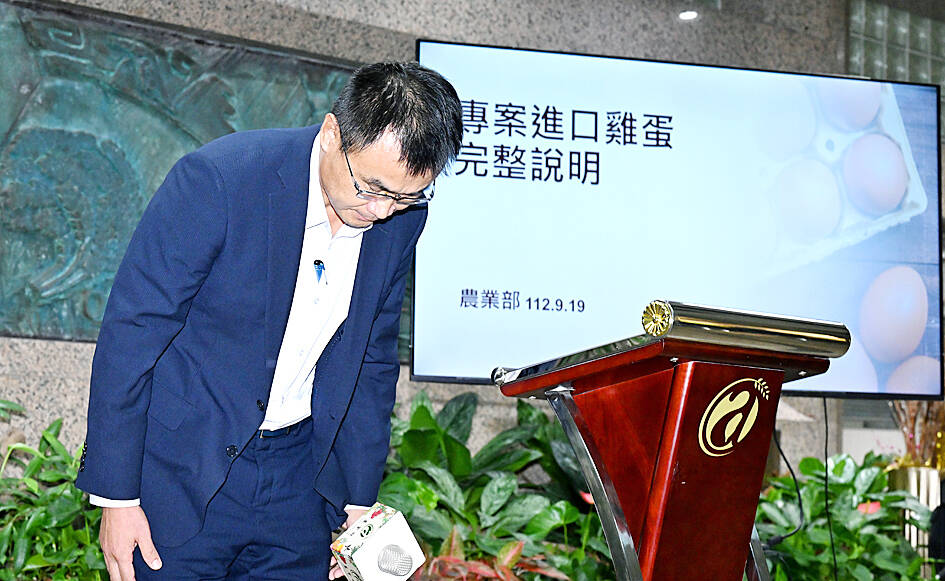Minister of Agriculture Chen Chi-chung (陳吉仲) last night announced that he would resign from his post.
Local media on Sunday reported that Chen had resigned due to controversy over the ministry’s egg import program. Later that same evening, the Executive Yuan said that Premier Chen Chien-jen (陳建仁) had asked the minister to stay on to resolve the issue.
Chen Chi-chung last night made public his decision to resign on Facebook, saying that this time he would not be dissuaded.

Photo: Liao Chen-huei, Taipei Times
Chen Chi-chung earlier yesterday apologized for the furor surrounding the egg import program, but added that misinformation had made the problems worse.
The government was right to initiate the program and the results, including egg prices stabilizing, justified the high costs, he said.
As part of the program, the ministry imported 145 million eggs from Brazil and six other nations from March to July to address a domestic shortage earlier this year.
However, 54 million eggs — or 37 percent of the imports, with a value of more than NT$200 million (US$6.25 million) — had to be destroyed, mostly because they expired in storage facilities after domestic production rebounded, the ministry said.
The government has also been criticized for being slow to provide information on the whereabouts of the imported eggs, thus failing to assuage fears among the public that the expired or substandard eggs might have been put on the market.
The ministry has said that no eggs were sold past their expiration date.
A batch of 20,000 imported eggs was recalled last week after incorrect expiration dates were printed on them.
Questions have also been asked about why Ultra Source, a company with capital of only NT$500,000, was contracted by the government to import 88 million eggs under the program.
Lin Tsung-hsien (林聰賢), president of the National Animal Industry Foundation which assisted the ministry in importing the eggs, also announced his resignation on Facebook last night.
Both resignations have been approved by the premier.

The Central Election Commission has amended election and recall regulations to require elected office candidates to provide proof that they have no Chinese citizenship, a Cabinet report said. The commission on Oct. 29 last year revised the Measures for the Permission of Family-based Residence, Long-term Residence and Settlement of People from the Mainland Area in the Taiwan Area (大陸地區人民在台灣地區依親居留長期居留或定居許可辦法), the Executive Yuan said in a report it submitted to the legislature for review. The revision requires Chinese citizens applying for permanent residency to submit notarial documents showing that they have lost their Chinese household record and have renounced — or have never

A magnitude 5.6 earthquake struck off the coast of Yilan County at 12:37pm today, with clear shaking felt across much of northern Taiwan. There were no immediate reports of damage. The epicenter of the quake was 16.9km east-southeast of Yilan County Hall offshore at a depth of 66.8km, Central Weather Administration (CWA) data showed. The maximum intensity registered at a 4 in Yilan County’s Nanao Township (南澳) on Taiwan’s seven-tier scale. Other parts of Yilan, as well as certain areas of Hualien County, Taipei, New Taipei City, Taoyuan, Hsinchu County, Taichung and Miaoli County, recorded intensities of 3. Residents of Yilan County and Taipei received

Taiwan has secured another breakthrough in fruit exports, with jujubes, dragon fruit and lychees approved for shipment to the EU, the Ministry of Agriculture said yesterday. The Animal and Plant Health Inspection Agency on Thursday received formal notification of the approval from the EU, the ministry said, adding that the decision was expected to expand Taiwanese fruit producers’ access to high-end European markets. Taiwan exported 126 tonnes of lychees last year, valued at US$1.48 million, with Japan accounting for 102 tonnes. Other export destinations included New Zealand, Hong Kong, the US and Australia, ministry data showed. Jujube exports totaled 103 tonnes, valued at

BIG SPENDERS: Foreign investors bought the most Taiwan equities since 2005, signaling confidence that an AI boom would continue to benefit chipmakers Taiwan Semiconductor Manufacturing Co’s (TSMC, 台積電) market capitalization swelled to US$2 trillion for the first time following a 4.25 percent rally in its American depositary receipts (ADR) overnight, putting the world’s biggest contract chipmaker sixth on the list of the world’s biggest companies by market capitalization, just behind Amazon.com Inc. The site CompaniesMarketcap.com ranked TSMC ahead of Saudi Aramco and Meta Platforms Inc. The Taiwanese company’s ADRs on Tuesday surged to US$385.75 on the New York Stock Exchange, as strong demand for artificial intelligence (AI) applications led to chip supply constraints and boost revenue growth to record-breaking levels. Each TSMC ADR represents